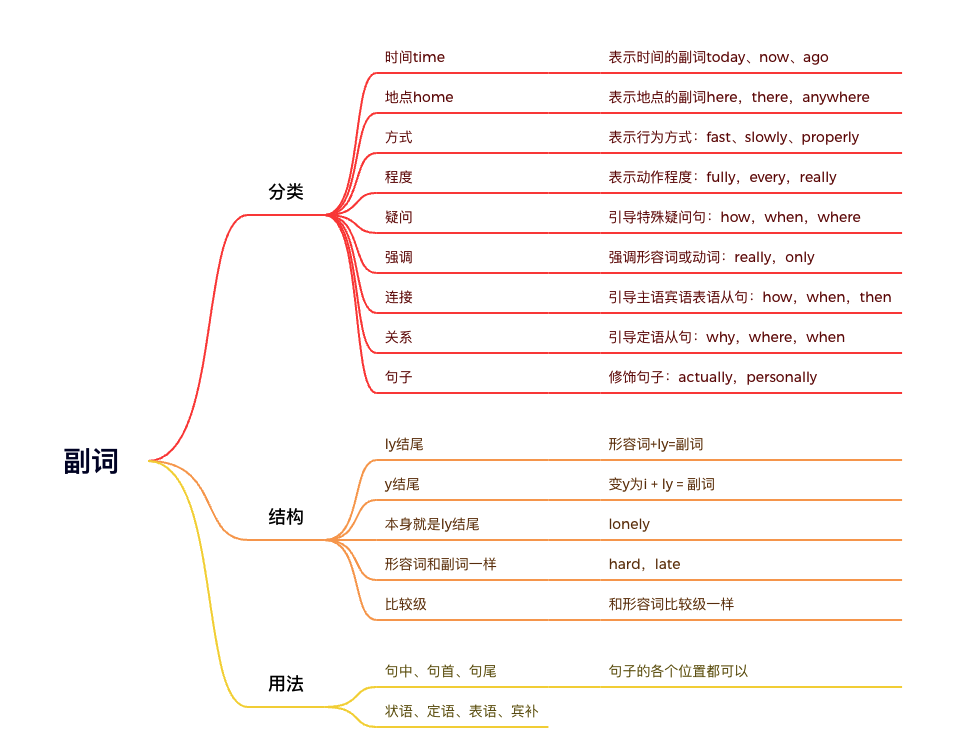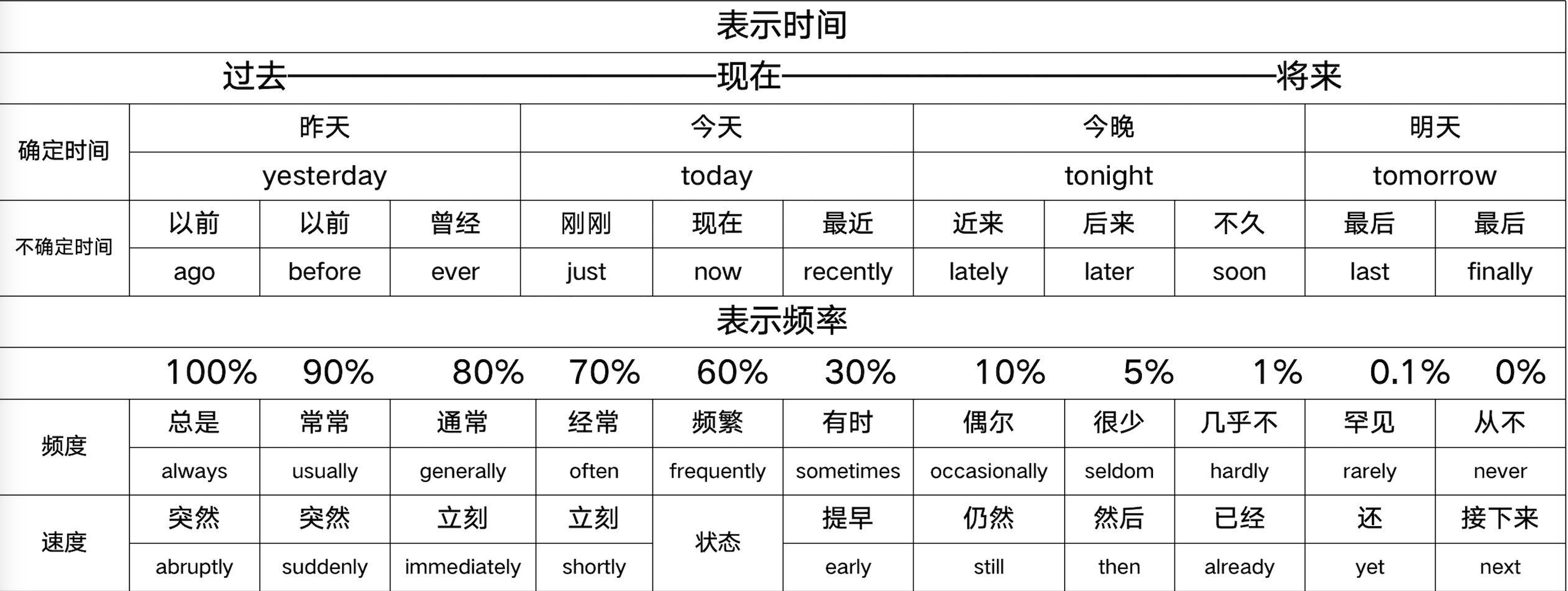04_副词
About 4 minenglishenglishLearning

一、分类
1、时间副词:表示时间或频率

2、地点副词
// 表地点
here(在这里),there(在那里)home(家),upstairs(在楼上),downstairs(在楼下),anywhere(任何地方),nowhere(无处),somewhere(某个地方),abroad(在国外),elsewhere(在别处)
// 表位置
above(上文),below(下面),down(在下方),up(在上方),out(向外),in(在里头),across(从一边...另一边),back(回到原处),along(向前),over(剩下),round(旋转),around(围绕),away(移走),near(在附近),off(离开),on(开着的),inside(内侧),outside(外侧),past(过去的)
Here is the remains of a mosque // 这里是一座清真寺的废墟)
3、方式副词
// 方式副词:表示行为方式
carefully(小心地),properly(正确地),anxiously(不安地),suddenly(突然地),normally(正常地),fast(快速地),calmly(平静地),politely(政治),proudly(自负地),softly(温柔地),warmly(热情地),slowly(缓慢地),badly(父亲)
Now listen carefully // 现在仔细听
4、程度副词
// 程度副词:表示动作程度
nearly(密切地),rather(相当),very(真正地),too(过于),fully(完全地),almost(差不多),extremely(极度),absolutely(绝对地),slightly(轻微地),simply(简单地),awfully(可怕地),deeply(深刻地),really(真正地),perfectly(完美地),quite(相当),much(非常)
It is running fast //它跑的很快
5、 疑问副词
// 疑问副词:引导特殊疑问句
how(怎样),when(什么时候),where(在那里),why(为什么)
Where are you going(你要去那里?)
6、 强调副词
// 强调副词:强调形容词或动词
completely(完全地),perfectly(完美地),really(真正地),totully(对极了),mainlly(主要地),only(只有)
A really cold day // 很冷的天
7、 连接副词
// 引导主语从句,宾语从句,表语从句或并列结构
how(怎样),when(什么时候),where(在那里),why(为什么),then(当时),however(然而),therefore(因此)
The problem is how he can do it // 问题是他如何做这事
You feel all things, than what did you do // 我感觉到了一切,然后你做了什么
8、关系副词
// 引导定语从句
when,where,why
I never forget the day when I got the award // 我永远不会忘记我获奖的那天
9、 句子副词
// 修饰句子
actually(实际地),personally(无理地),certainly(无疑),definitely(肯定地)
Actually, it is more than we need // 实际上,它比我们需要的还要多
二、结构
// ly结尾的副词:大多数情况形容词+ly等于副词
careful > carefully
beautiful > beautifully
important > importantlyf // 重要地
// y结尾副词:变y为i加ly
lucky > luckily
busy > busily // 忙碌地
dirty > dirtily // 龌龊地
// wards,wise结尾的
inwards(内向地),eastwards(向东方地),clockwise(顺时针的),likewise(同样地)
// 本身就是ly结尾
ugly(丑陋地),lonely(孤独地),likely(可能的)
// 形容词和副词一样
hard(坚固地),late(晚),fast(快速),tight(紧紧地)
// 本身就是副词
so(所以),very(真正地),just(正好)
// 副词比较级变化,规则跟形容词比较级一样,形容词比较级特殊结构副词一样能用
// 原级:A + 实意动词 + as + 副词原形 + as + B
You play basketball as well as XuKun Cai // 你篮球打的跟蔡徐坤一样好
// 比较级:A + 实意动词 + 副词比较级 + than + B
I know you better than she. // 我比她更了解你
// 最高级:A + 实意动词 + the + 副词最高级 + B
Rice grows the best in soil fertile. // 水稻在肥沃土地里生长得最好
三、用法
放置位置
句首:why are you always late. // 你为什么总迟到
句中:She angrilly closed the door. // 她生气的把门关了
句尾:We must work hard. // 我们必须努力工作
做句子成分
// 作状语
Loot at the photo carefully // 仔细的看这照片
// 作表语
The meeting is over. // 会议结束了
// 作定语
The shops around are very cheap. // 附近商店东西很便宜
// 作宾补
You come so late. // 你来太晚了
四、易混
// 1、too、also、eigher、nor
// too:肯定句和疑问句句尾,用逗号隔开
Are you chinese, too? // 你也是中国人
// alse:肯定句的谓语动词之前,系动词后
You are alse Chinese. // 你也是中国人
// eigher: 否定句句尾,用逗号隔开
I am not luckly, either. // 我也不幸运
// nor: 放句首
Nor is Peter anywhere a good man. // 皮特不是个好人
// 2、sometimes,sometime,some times,some time
// sometimes:有时候
Sometimes I go shopping in the mall. // 有时候我去大商场购物
// sometime:未来的某个时候
Peter, I will meet your mother sometime. // 皮特,我那天去见下你的妈妈
// some times:很多次(一次once,两次twice)
You have treated me quite some times recently, Now it's my turn. 你已经请我好几次了, 这次轮到我了
// some time: 一些时间
I should stay at home some time. // 我应该呆在家一段时间时间
// 3、farther、further: 表示地点距离远的时候,两个词都能用,表示更远。具体远用farther或further,抽象远用further
Can we walk farther/further tomorrow? // 我们明天能走远点吗
See under for further information. // 更多内容详见下文
// 4、most、mostly
// most(名词、形容词、副词):表示最、很、十分
The most outlandish ideas. // 最奇特的想法
// mostly(副词):表示主要的、大部分地
The atoms themselves are mostly empty space. // 原子本省大部分地空间是间隙